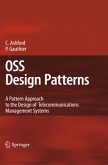The management of telecommunications networks and services is one of the most challenging of software endeavors-partly because of the size and the distributed nature of networks; partly because of the convergence of communications techno- gies; but mainly because of sheer complexity and diversity of networks and services. The TM Forum s Solutions Frameworks (NGOSS) help address these challenges by providing a framework for the development of management applications-those software applications that provide the building blocks for management solutions. The members of the TM Forum have elaborated many parts of NGOSS to make it practical-including in the area of information modeling, process analysis, and c- tract de?nition. This book further elaborates NGOSS by examining the challenging area of interface design. One of the costs of deploying a new service is the cost of integrating all the necessary applications into an effective software solution to manage the service. This cost has been dubbed the "integration tax" and can turn out to be ?ve times the capital cost of procuring the management software in the ?rst place. From their long experience of the design and standardization of management applications, the authors have extracted a core set of design patterns for the dev- opment of effective and consistent interfaces to management applications. Adopting these patterns across the industry could reduce the learning curve for software - velopers and allow service providers and systems integrators to rapidly and reliably deploy management solutions and thereby markedly reduce the integration tax.








